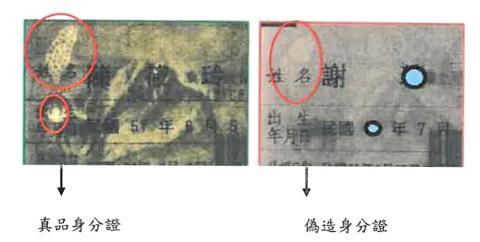Fake Republic of China (ROC) identification cards made in China pose the same level of threat to national security as African swine fever, Democratic Progressive Party Legislator Lai Jui-lung (賴瑞隆) said yesterday.
The national ID card has the best anti-counterfeit technology among all identification documents in the nation, a Ministry of the Interior official said yesterday on condition of anonymity, but added that the ministry has noticed recent cases of fake national IDs “that looked almost authentic.”
China’s ability to supply anti-counterfeit paper, color-changing ink and other materials — some of which can be purchased via the Internet — to produce ROC identification cards could have an impact on Taiwan’s security, the source said.

Photo courtesy of the Ministry of the Interior
People could use fake national ID cards to apply for passports, impersonate others or take out loans, or Chinese intelligence officers or spies could use them to engage in clandestine work, the source said.
For example, each year, the military opens its camps to the public for visits as a way to promote civil defense and display its advanced weapons, the source said.
Taiwanese can tour the grounds by showing their national ID cards, but Chinese tourists are prevented from entering, the source added.
If counterfeit technology is capable of producing fake IDs that look authentic, then Chinese with ulterior motives could enter military camps using fake IDs and survey Taiwan’s military facilities and equipment, the source said.
Lai said that if fake ROC IDs are produced in China or used by Chinese intelligence officers to enter Taiwan, this would be as “scary” as the outbreak of African swine fever in China.
The potential impact would be enormous, he said, urging the government to introduce national ID cards with integrated chips soon to curtail the threat.
As China steps up its “united front” tactics against Taiwan, the number of unidentified individuals who are lurking in Taiwan is increasing, he said.
The national security and police agencies should investigate how to prevent or ban the sale of “toxic pork” and materials used in the production of fake IDs via the Internet, he said.
The Executive Yuan last month announced that it would replace national ID cards with electronic ID cards in the second half of next year.
The new ID cards would be harder to counterfeit than the current cards, which are made of paper, the ministry said.

US President Donald Trump yesterday announced sweeping "reciprocal tariffs" on US trading partners, including a 32 percent tax on goods from Taiwan that is set to take effect on Wednesday. At a Rose Garden event, Trump declared a 10 percent baseline tax on imports from all countries, with the White House saying it would take effect on Saturday. Countries with larger trade surpluses with the US would face higher duties beginning on Wednesday, including Taiwan (32 percent), China (34 percent), Japan (24 percent), South Korea (25 percent), Vietnam (46 percent) and Thailand (36 percent). Canada and Mexico, the two largest US trading

AIR SUPPORT: The Ministry of National Defense thanked the US for the delivery, adding that it was an indicator of the White House’s commitment to the Taiwan Relations Act Deputy Minister of National Defense Po Horng-huei (柏鴻輝) and Representative to the US Alexander Yui on Friday attended a delivery ceremony for the first of Taiwan’s long-awaited 66 F-16C/D Block 70 jets at a Lockheed Martin Corp factory in Greenville, South Carolina. “We are so proud to be the global home of the F-16 and to support Taiwan’s air defense capabilities,” US Representative William Timmons wrote on X, alongside a photograph of Taiwanese and US officials at the event. The F-16C/D Block 70 jets Taiwan ordered have the same capabilities as aircraft that had been upgraded to F-16Vs. The batch of Lockheed Martin

GRIDLOCK: The National Fire Agency’s Special Search and Rescue team is on standby to travel to the countries to help out with the rescue effort A powerful earthquake rocked Myanmar and neighboring Thailand yesterday, killing at least three people in Bangkok and burying dozens when a high-rise building under construction collapsed. Footage shared on social media from Myanmar’s second-largest city showed widespread destruction, raising fears that many were trapped under the rubble or killed. The magnitude 7.7 earthquake, with an epicenter near Mandalay in Myanmar, struck at midday and was followed by a strong magnitude 6.4 aftershock. The extent of death, injury and destruction — especially in Myanmar, which is embroiled in a civil war and where information is tightly controlled at the best of times —

China's military today said it began joint army, navy and rocket force exercises around Taiwan to "serve as a stern warning and powerful deterrent against Taiwanese independence," calling President William Lai (賴清德) a "parasite." The exercises come after Lai called Beijing a "foreign hostile force" last month. More than 10 Chinese military ships approached close to Taiwan's 24 nautical mile (44.4km) contiguous zone this morning and Taiwan sent its own warships to respond, two senior Taiwanese officials said. Taiwan has not yet detected any live fire by the Chinese military so far, one of the officials said. The drills took place after US Secretary